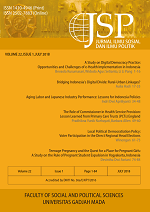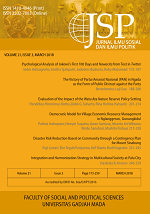Ethics of the Real for Political Analysis: Reflection on the (Renewed) Conflict in Palestine
Joash Tapiheru(1*)
(1) Department of Politics and Government, Universitas Gadjah Mada, Indonesia
(*) Corresponding Author
Abstract
This article expounds critical reflections and analysis on the discourse regarding the conflict in Palestine. The case is posited through the lens of a certain ethical position, namely the ethics of the real and the framework that it supports, namely Lacanian Psychoanalysis. Reflecting on the impasse that the discourse on the conflict in Palestine has been confronted with, this article argues that political analysis may take insight from psychoanalysis to make the course of analysis directed toward the deconstruction of the obsessive neuroticism at the core of this impasse. In doing so, the political analysis should take a retroductive course, moving back and forth between the ontological and ontical planes of the reality analysed. This enables political analysis to account more systematically the factors of inevitable lack in the structure and split on the subject and the corresponding affective dimension, which are central in the political constitution of social formation and identity. Through the analytical lens and approach from psychoanalysis, this article investigates and demonstrates how most of the discourses on the conflict in Palestine have strong propensity to avoid the conflict, which on its turn counterintuitively serve to prolong or fan further conflict, as they focus on the neatness and seamlessness of the reality constituted through their own discourses rather than grappling with the conflict.
Keywords
Full Text:
PDFReferences
Chomsky, N., & Pape, I. (2016). Gaza in Crisis: Reflection on Israel's War Against the Palestinians. Chicago, Illinois: Haymarket Books.
Fink, B. (1995). The Lacanian Subject: Between Language and Jouissance. USA: Princeton University Press.
Fink, B. (1999). A Clinical Introduction to Lacanian Psychoanalysis: Theory and Technique. USA: Harvard University Press.
Fink, B. (2004). Lacan to the Letter: Reading Ecrits Closely. Minneapolis: University of Minnesota Press.
Glynos, J. (2002a). Theory and evidence in the Freudian field. In J. Glynos, & Y. Stavrakakis, Lacan & Science (pp. 13-50). London; New York: Karnac.
Glynos, J. (2002b). Psychoanalysis operates upon the subject of science. In J. Glynos, & Y. Stavrakakis, Lacan & Science (pp. 51-88). London; New York: Karnac.
Glynos, J., & Howarth, D. (2007). Logics of Critical Explanations in Social and Political Theory. New York: Routledge.
Karsh, E. (1996). Rewriting Israel's History. Middle East Quarterly Volume 3:2, 19-29.
Lacan, J. (2005). Ecrits: the First Complete Edition in English (Bruce Fink trans.). USA: W.W. Norton & Company.
Lacan, J. (2006). The Other Side of Psychoanalysis: The Seminar of Jacques Lacan Book XVII (Russell Grigg trans.). USA: W.W. Norton & Company.
Laclau, E. (1990). New Reflections on the Revolution of Our Time. London: Verso.
Laclau, E., & Mouffe, C. (2014). Hegemony and Socialist Strategy: Towards Radical Democratic Politics Second Edition. London; New York: Verso.
Lukes, S. (2005). Power: a Radical View Second Edition. Hampshire; New York: Palgrave Macmillan.
Masalha, N. (1991). A Critique of Benny Morris. Journal of Palestine Studies, 21(1), 90-97.
Morris, B. (2009, November 28). Derisionist History. Retrieved from The New Republic: https://newrepublic.com/article/71480/ derisionist-history
Morris, B. (2017, March 11). The Liar as Hero. Ret rieved from The New Repub lic: https://newrepublic.com/article/85344/ ilan-pappe-sloppy-dishonest-historian
Mouffe, C. (2005). On the Political. New York: Routledge.
Norval, A. (June 2004). Hegemony after deconstruction: The consequences of undecidablity. Journal of Political Ideologies 9(2), 139-157.
Pappe, I. (2011). The Ethnic Cleansing of the Palestine. Oxford: Oneworld Publications.
Shavit, A. (2004, January 8). Survival of the fittest? An interview with Benny Morris. Retrieved from Haaretz: https://www. haaretz.com/1.5262454
Stavrakakis, Y. (1999). Lacan and the Political. New York: Routledge.
Tapiheru, J. (2021). The Dimension of Coercion in Chantal Mouffe's Theory of Agonism: Theo retical Reflection and Empirical Application to Local Politics in UK-PhD Dissertation. Colchester: The University of Essex.
Zizek, S. (1989). The Sublime Object of Ideology. London: Verso.
Article Metrics
Refbacks
- There are currently no refbacks.
Copyright (c) 2022 Jurnal Ilmu Sosial dan Ilmu Politik

This work is licensed under a Creative Commons Attribution-NonCommercial-NoDerivatives 4.0 International License.






















